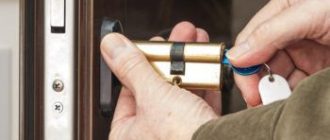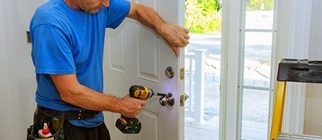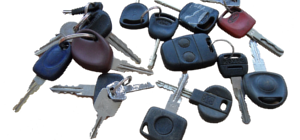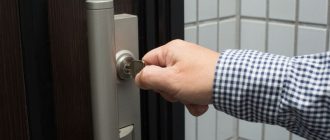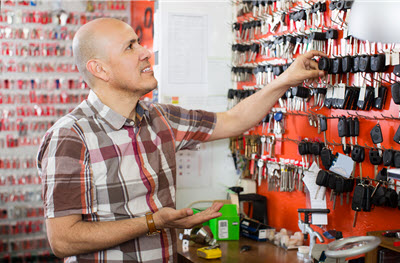
Recognizing Popular Locksmith Scams and How to Avoid Them
Locksmith scams have become popular in recent years, with many unsuspecting homeowners falling victim to their deceitful tactics. These scams involve locksmiths who take advantage of emergency situations, such as being locked out of your home or car, and exploit them for their own gain. To avoid falling prey to these scams, it is important to be informed and take necessary precautions.
One of the best ways to avoid locksmith scams is by doing your research beforehand. Take the time to find reputable locksmiths in your area and keep their contact information handy. This way, when you find yourself in an emergency situation, you can call a locksmith you trust, rather than a scammer.
Recognizing signs of a scam locksmith is also crucial. If a locksmith arrives in an unmarked vehicle or tries to charge an exorbitant fee for their services, it is a red flag. Reputable locksmiths usually have clearly marked vehicles and will provide you with an estimate before starting any work. If something seems off, trust your instincts and find another locksmith.
In addition, it is important to be wary of locksmiths who insist on drilling the lock or replacing it immediately. Reputable locksmiths will exhaust all other options before resorting to such measures. They will try to pick the lock or use other non-destructive methods first. If a locksmith is quick to destroy your lock, it is likely a scam.
By following these tips and tricks, you can avoid falling victim to popular locksmith scams. Taking the time to research and find reputable locksmiths, recognizing potential red flags, and being cautious of locksmiths who suggest drastic measures will help you protect yourself and your property.
Finding a Reputable Locksmith
When it comes to locksmiths, it’s crucial to find a reputable one to avoid falling into popular scams. Here are some tips to help you find a trustworthy locksmith:
1. Do your research: Before hiring a locksmith, take the time to research them thoroughly. Look for reviews or testimonials from previous customers to get an idea of their reputation.
2. Ask for recommendations: Reach out to friends, family, or neighbors who have recently used a locksmith’s services. Ask them about their experience and if they would recommend the locksmith they used.
3. Check for proper credentials: A legitimate locksmith should have the proper credentials and licenses. Ask for proof of their qualifications and make sure they are certified and insured.
4. Get estimates: When contacting a locksmith, ask for a detailed estimate of the cost for their services. Avoid locksmiths who give vague or overly low estimates, as this could be a sign of a scam.
5. Verify their identity: When the locksmith arrives, ask them to provide identification and proof of certification. A reputable locksmith will have no problem showing you their credentials.
6. Trust your instincts: If something feels off or suspicious, trust your gut instinct. It’s better to be safe than sorry, so find another locksmith if you have any doubts.
Remember, taking the time to find a reputable locksmith can save you from falling victim to popular locksmith scams. By following these tips, you can ensure that your locksmith experience is a positive and secure one.
Checking Online Reviews
When in need of a locksmith, it is important to do your due diligence before hiring one. Nowadays, there are many scam locksmiths out there looking to take advantage of unsuspecting customers. One effective way to avoid falling victim to these scams is by checking online reviews of locksmiths before hiring them.
Checking online reviews helps in recognizing popular locksmith scams and finding trustworthy locksmiths. By reading the experiences of previous customers, you can get an idea of the quality of service provided by the locksmith. Positive reviews can give you confidence that the locksmith is reliable and reputable.
However, it is important to be wary of overly positive reviews or reviews that seem suspicious. Some scam locksmiths may post fake reviews to boost their reputation. It is advisable to look for a balance of positive and negative reviews, as this indicates the authenticity of the reviews.
There are many online platforms where you can find reviews for locksmiths, such as Google, Yelp, and Angie’s List. Take the time to read through these reviews and pay attention to any recurring complaints or red flags. This will help you make an informed decision and avoid falling into the trap of a scam locksmith.
In addition to online reviews, it is also recommended to ask for recommendations from friends, family, or neighbors who have used locksmith services in the past. Their personal experience can give you valuable insights and help you find a reliable locksmith.
In conclusion, checking online reviews is an essential step in avoiding popular locksmith scams. Take the time to research and read reviews before hiring a locksmith to ensure you are choosing a trustworthy and reliable professional.
Asking for Recommendations
One of the best ways to avoid locksmith scams is by asking for recommendations. When you find yourself in need of a locksmith, reach out to your friends, family, and neighbors and ask if they have any locksmiths that they trust and would recommend.
Personal recommendations are valuable because you can trust the opinions of people you know and they have already had a positive experience with a particular locksmith. This can save you from falling victim to scams and dealing with untrustworthy or unqualified locksmiths.
If you don’t know anyone who can give you a recommendation, you can also turn to online review websites such as Yelp or Google. These platforms allow people to leave reviews and ratings for local businesses including locksmiths. By reading these reviews, you can get an idea of the quality of service provided by different locksmiths in your area.
| You can trust the opinions of people you know | May not get enough recommendations |
| Save yourself from falling victim to scams | Reviews may not always be reliable |
| Online reviews provide insights from other customers | Can be time-consuming to research and read reviews |
By asking for recommendations, you can increase your chances of finding a trustworthy locksmith and avoid falling for common locksmith scams. Take the time to reach out to your network or use online resources to gather information about different locksmiths before making a decision.
Verifying Credentials and Licenses
When it comes to hiring a locksmith, it is important to verify their credentials and licenses to avoid falling victim to popular scams. By recognizing the signs of a legitimate locksmith, you can effectively avoid hiring a fraudulent one.
Here are some tips to help you verify the credentials and licenses of a locksmith:
- Check for a valid license: Make sure the locksmith has a valid license to operate in your area. You can contact the relevant licensing agency or check their website to verify the license.
- Ask for identification: A reputable locksmith will always carry proper identification, such as a company ID badge or driver’s license. Ask to see their identification before allowing them to start any work.
- Get references: Ask the locksmith for references from past customers. Contact these references to inquire about the quality of the locksmith’s work and their overall experience.
- Research the company: Take the time to research the locksmith company online. Look for customer reviews and ratings on reputable websites. This will give you a better idea of the company’s reputation.
- Ask for a written estimate: Before hiring a locksmith, always ask for a written estimate. This will help you avoid any surprises or hidden fees once the work is completed.
By following these tips and taking the necessary steps to verify the credentials and licenses of a locksmith, you can avoid falling victim to popular scams and ensure that you are hiring a reputable professional.
Getting a Written Estimate
When you find yourself in need of a locksmith, it is important to avoid falling victim to locksmith scams. One of the best ways to protect yourself from these scams is by recognizing and avoiding them. One common scam is when a locksmith gives you a low estimate over the phone, but then significantly raises the price once they arrive at your location. To avoid this, always ask for a written estimate before the locksmith begins any work.
A written estimate is a document that outlines the cost of the locksmith services you require. It should include a breakdown of the expenses, such as the cost of labor, any parts or materials needed, and any additional fees. By getting a written estimate, you have a clear understanding of the expected cost and can avoid any surprises or hidden charges.
When you receive the estimate, carefully review it and make sure everything is clear and transparent. If there are any discrepancies or if the estimate seems too high, question the locksmith about it. A reputable locksmith should be able to provide a reasonable explanation or adjust the estimate accordingly.
It is also important to note that a written estimate is not a binding contract, so you are not obligated to hire the locksmith just because they provided an estimate. If something doesn’t feel right or if you are unsure about the locksmith’s credibility, don’t hesitate to seek a second opinion or get estimates from other locksmiths.
Remember, getting a written estimate is an essential step in protecting yourself from locksmith scams. It helps ensure transparency and prevents any unexpected costs. Don’t be afraid to ask for one, and if a locksmith refuses to provide a written estimate, it’s a red flag that you should find someone else to hire.
Avoiding Over-the-Phone Price Quotes
When it comes to locksmith services, one of the most popular scams to be aware of is the over-the-phone price quote. Many scammers will try to lure unsuspecting customers with a low price over the phone, only to dramatically increase it once they arrive at the scene. To avoid falling victim to this scam, it’s important to recognize the warning signs and take precautions.
Firstly, legitimate locksmiths will generally avoid giving price quotes over the phone without first assessing the situation. This is because each locksmithing job can be unique and may require different tools and techniques to complete. Instead, a reputable locksmith will typically provide a rough estimate or range based on the information you provide about the problem.
Additionally, it’s important to be cautious of locksmiths who insist on cash payment or ask for payment upfront. This is often a red flag indicating a potential scam. It’s best to choose a locksmith who accepts various forms of payment and provides a detailed invoice with a breakdown of the costs, including any additional fees or surcharges.
Another tip to avoid over-the-phone price quote scams is to ask for recommendations or do thorough research before hiring a locksmith. Reading reviews and checking their credentials can help you determine if they are trustworthy and reputable. You can also contact your local locksmith association or consumer protection agency for recommendations.
Overall, avoiding over-the-phone price quotes is crucial in protecting yourself from locksmith scams. By being aware of the warning signs and taking the necessary precautions, you can ensure that you are hiring a legitimate and trustworthy locksmith who will provide fair and transparent pricing for their services.
Watching Out for Lowball Offers
When it comes to locksmith scams, one of the most popular tactics used by scammers is lowballing their offers. These locksmiths advertise their services at incredibly low prices, luring unsuspecting customers into their traps. It is important to stay vigilant and avoid falling for these scams.
Lowball offers may seem attractive at first, but they often lead to a series of hidden fees and additional charges. Once a customer contacts one of these locksmiths, they may quote an unbelievably low price over the phone or online. However, they will then find ways to increase the final cost once they arrive at the location.
One common tactic used by these scammers is claiming the lock is more complex than originally anticipated. They may argue that the job requires special tools or materials, resulting in higher fees. In some cases, these locksmiths may even purposely damage the lock to make it seem irreparable, forcing the customer to replace it at a significantly higher cost.
To avoid falling victim to these lowball offers, it is important to do thorough research before hiring a locksmith. Look for reputable locksmiths who have positive reviews and recommendations. Get quotes from multiple locksmiths and compare them to ensure they are within a reasonable range.
Additionally, always ask for a written estimate before any work is done. This will help protect you from unexpected fees and charges. If a locksmith refuses to provide a written estimate or gives evasive answers, it is a red flag and a sign that they may be trying to scam you.
| 1. Do thorough research and choose a reputable locksmith. |
| 2. Get quotes from multiple locksmiths and compare them. |
| 3. Ask for a written estimate before any work is done. |
| 4. Be cautious of locksmiths who refuse to provide a written estimate. |
By following these tips and staying informed about popular locksmith scams, you can avoid falling victim to lowball offers and ensure that you receive reliable and trustworthy locksmith services.
Being Wary of Cash-Only Payments
When it comes to locksmith scams, one popular tactic used by scammers is to insist on cash-only payments. This is a red flag that should raise suspicion and caution.
Legitimate locksmith companies and professionals typically accept various payment methods, including credit cards, checks, or electronic payments. By insisting on cash-only payments, scammers try to avoid leaving a paper trail and make it more difficult for victims to dispute the charges or get a refund.
Recognizing the locksmith scams involving cash-only payments can help protect yourself from falling victim to such fraud. It’s important to research and choose a reputable locksmith company that offers multiple payment options.
If a locksmith insists on cash-only payments, consider it a warning sign and proceed with caution. Ask for an explanation as to why cash is the only acceptable payment method and compare their response with the practices of reputable locksmiths. Trust your instincts and be wary of anyone who pressures you into paying in cash.
Furthermore, be sure to get a detailed receipt for any services rendered and keep records of all your transactions. This documentation will be important if you encounter any issues later on.
|
Tips to remember:
|
Asking for Identification
When hiring a locksmith, one of the most important steps in avoiding scams is recognizing their identification. Legitimate locksmiths always carry proper identification to ensure that customers can trust the person they are allowing into their homes or vehicles.
Why is it important to ask for identification?
Asking for identification is crucial in preventing locksmith scams. By verifying the locksmith’s identification, you can confirm their legitimacy and ensure you are dealing with a licensed professional.
How can you recognize valid identification?
When the locksmith arrives, ask to see their identification card or license. Valid identification typically includes the locksmith’s name, photograph, and license number. Look for a professional appearance and ensure that the information on the ID matches the details they provided during your initial communication.
Why should you avoid locksmiths without proper identification?
Locksmiths who refuse or cannot provide valid identification should be avoided. Without proper identification, there is no way to verify their credentials, and they may not be trustworthy or qualified for the job. Hiring an unprofessional locksmith increases the risk of scams, unauthorized access, and potentially unsafe situations.
Conclusion
When hiring a locksmith, always ask for identification as a necessary precaution to avoid scams. Recognizing valid identification helps ensure you are dealing with a reputable professional who can provide reliable and secure locksmith services.
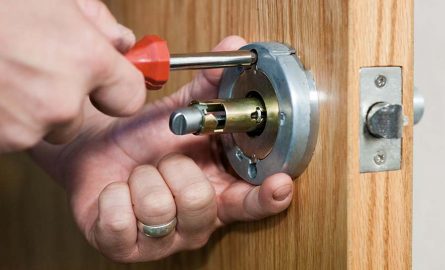
Understanding Common Scam Techniques
When it comes to finding a locksmith, it’s important to be aware of the common scams that are popular among them. By understanding these scam techniques, you can avoid falling victim to them.
| Fake Listings | Some locksmiths create fake listings with local phone numbers and addresses to appear legitimate. These listings often lead to call centers that connect you with unqualified or even fraudulent locksmiths. |
| Bait-and-Switch Pricing | Locksmiths may quote you a low price over the phone, but when they arrive at your location, they suddenly increase the price, claiming additional labor or parts are needed. |
| Drilling Locks | Some locksmiths will claim that your lock cannot be picked and that drilling is the only solution. This is often a ruse to charge you more for a new lock and installation. |
| Unmarked Vehicles | Scam locksmiths often operate in unmarked or generic vehicles, lacking any branding or identification. This makes it difficult to trace or hold them accountable for their actions. |
| Hidden Charges | Locksmiths may advertise a low service call fee, but once they arrive, they add additional charges for things like mileage, emergency services, or using special tools. |
| Fear Tactics | Some locksmiths use fear tactics to pressure you into unnecessary services. They may claim that your lock is too weak and needs to be replaced immediately to avoid a break-in, even if it’s not true. |
By staying vigilant and knowing about these common scam techniques, you can avoid falling victim to unscrupulous locksmiths. Do thorough research, read reviews, and choose a reputable locksmith to ensure the security of your home or business.
Learning about Locksmith Associations
When it comes to avoiding popular locksmith scams, it’s crucial to educate yourself about reputable locksmith associations. These associations play a vital role in recognizing trustworthy and professional locksmiths, helping you avoid becoming a victim of fraud.
Locksmith associations serve as a regulatory body that sets standards and guidelines for locksmithing professionals. By being a member of an association, locksmiths demonstrate their commitment to maintaining high-quality services and ethical business practices.
Here are a few key reasons why learning about locksmith associations can help you avoid scams:
|
1. Reliable Source of Information: |
Locksmith associations provide a reliable source of information about licensed locksmiths in your area. By checking their membership directories or websites, you can find trustworthy locksmiths who adhere to industry standards. |
|
2. Code of Ethics: |
Locksmith associations establish a code of ethics that their members must follow. This code ensures that locksmiths act responsibly, maintain confidentiality, and provide fair pricing to their customers, reducing the risk of scams. |
|
3. Training and Certification: |
Associations often offer training programs and certifications to locksmiths, ensuring their skills and knowledge are up to date. By choosing a locksmith associated with a reputable organization, you can have peace of mind knowing they have received proper training. |
|
4. Dispute Resolution: |
In case of any disputes or complaints, reputable locksmith associations provide mechanisms for resolving issues between locksmiths and clients. This added layer of protection can help you resolve problems without getting scammed. |
Remember, locksmith associations are valuable resources that can assist you in finding reliable locksmiths and avoiding popular scams. Before hiring a locksmith, take the time to research and verify their association membership to ensure you receive quality service and avoid being taken advantage of.
Reporting Scams to Authorities
- Recognizing locksmith scams is the first step to avoiding them, but it is also important to report any scams that you encounter to the relevant authorities.
- If you have been a victim of a locksmith scam, you can report it to your local police department. Provide them with all the details of the scam, including the name of the locksmith company, any contact information you have, and any evidence you may have, such as receipts or correspondence.
- You may also want to file a complaint with your state attorney general’s office or consumer protection agency. They are responsible for protecting consumers from fraudulent practices.
- Another option is to report the scam to the Better Business Bureau (BBB). The BBB keeps track of complaints against businesses and can help mediate disputes between consumers and companies.
- If the scam involves an online transaction, you can report it to the Federal Trade Commission (FTC). The FTC collects complaints about various types of scams, including locksmith scams, and uses this information to track patterns and take action against scammers.
- Finally, you may want to leave a review or rating on review websites or social media platforms. This can help warn others about the scam and prevent them from falling victim to it.
By reporting scams to the authorities, you not only help protect yourself but also contribute to the prevention and prosecution of locksmith scams. Your actions can make a difference in ensuring the safety and security of others.
Spreading Awareness
One of the most effective ways to protect yourself from locksmith scams is to spread awareness about them. By educating yourself and others, you can avoid falling victim to popular scams and help others recognize them as well.
Here are some tips for spreading awareness:
| 1. Share information: | Share articles, blog posts, and social media content that provide information about common locksmith scams. By sharing this information with your friends, family, and community, you can help prevent others from being scammed. |
| 2. Talk to local businesses: | Reach out to local businesses and organizations to educate them about locksmith scams. Provide them with resources and information to help them recognize and avoid these scams. |
| 3. Report scams: | If you encounter a locksmith scam or suspect fraudulent activity, report it to your local authorities and consumer protection agencies. By reporting scams, you can help authorities take action and protect others from falling victim to similar scams. |
| 4. Create awareness campaigns: | Organize awareness campaigns in your community to educate people about locksmith scams. You can host events, workshops, or distribute flyers to raise awareness and provide tips on how to avoid scams. |
Remember, spreading awareness is an essential step in protecting yourself and others from locksmith scams. By working together to educate and inform, we can help create a safer environment for everyone.
Q&A:
Are locksmith scams common?
Yes, locksmith scams are unfortunately quite common. Scammers take advantage of people who are in urgent need of locksmith services and charge exorbitant fees or provide subpar work.
How can I recognize a legitimate locksmith?
To recognize a legitimate locksmith, look for a physical address, a genuine business name, and a license or certification. Also, make sure that the locksmith arrives in a marked vehicle and asks for identification before starting the job.
What are some common red flags to watch out for when hiring a locksmith?
Some common red flags include locksmiths who give a vague or unusually low price estimate over the phone, arrive in an unmarked vehicle, or request cash payment only. It’s also suspicious if a locksmith doesn’t ask for identification or can’t provide proof of insurance or a license.
What should I do if I suspect I’m being scammed by a locksmith?
If you suspect you’re being scammed, trust your instincts and end the transaction immediately. Call another locksmith for assistance and report the suspicious locksmith to your local authorities or consumer protection agency.
What can I do to avoid locksmith scams?
To avoid locksmith scams, do your research in advance, find a reputable locksmith with good reviews, and save their contact information in case of emergencies. It’s also a good idea to get quotes from multiple locksmiths and compare prices before making a decision.
What are some common locksmith scams?
Some common locksmith scams include bait and switch tactics, charging exorbitant fees, and damaging the lock intentionally to charge more for repairs.

